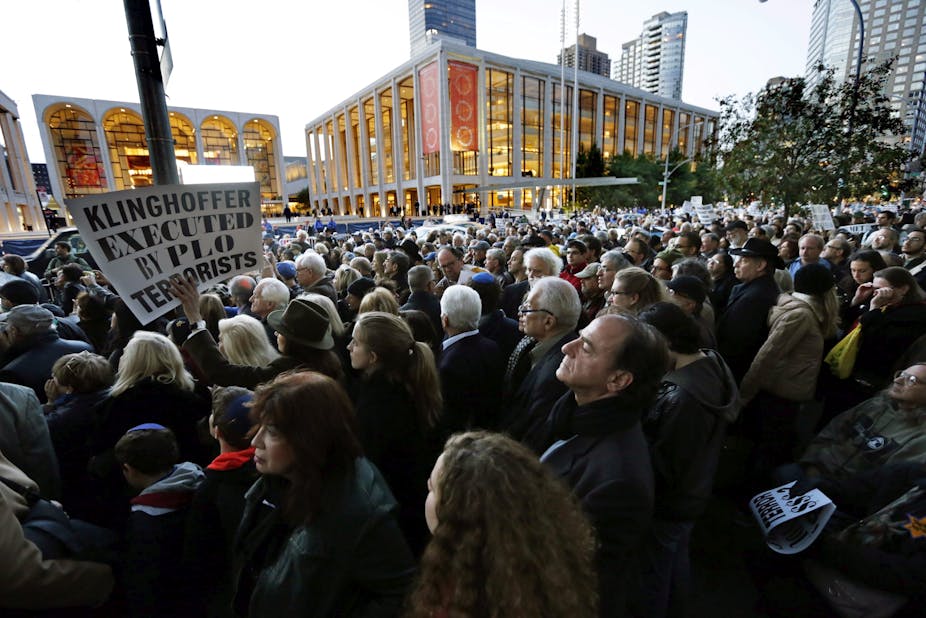On Monday night in New York, protesters demonstrated against the premiere of John Adams’ 1991 opera The Death of Klinghoffer, at the Metropolitan Opera at Lincoln Center. Its subject matter is the murder of Leon Klinghoffer, a retired and disabled Jewish-American who was a passenger aboard the Achille Lauro cruise ship that was hijacked by four members of the Palestinian Liberation Front in 1985.
Opera performances in Australia rarely attract such public controversy. Earlier this month, however, West Australian Opera decided to avoid scheduling Bizet’s opera Carmen for the next two years because of a A$400,000 sponsorship deal with the West Australian government health agency Healthway. The offensive content here? Act One of that opera is set outside a cigarette factory.
It has in fact been been quite a year for national conversations about the relationship between arts institutions and Australian public life.
Most recently, we’ve had cause to reflect upon the visionary policies of the deceased former prime minister and champion of the arts, Gough Whitlam.

As I have argued previously in relation to the decision of the Biennale of Sydney to part company with major sponsor Transfield, such conversations are to be welcomed.
We should be encouraged to think more critically about the roles and responsibilities of our major performing institutions, not least because they are in receipt of significant public funds.
A recent Platform Paper by the artistic director of the Queensland Theatre Company Wesley Enoch, entitled Take Me To Your Leader, suggests, however a reason why such controversies are otherwise so rare. Enoch argues that our major publicly-funded performing arts bodies are now so concerned not to bite the hand that feeds them that they have become timid. Here cultural leadership can mean little more than “simply being in charge of a cultural institution”.
Writing on a Crikey blog, another commentator noted with reference to last year’s Australian Theatre Forum that:
those who are attracted to leading positions in these organisations have – with few exceptions – internalised the processes of risk-aversion, constraint and managerialism. If transgression exists, it is deftly spun into a commodity. In that place there, you will not find cultural leadership.
At first sight this case seems overstated, if not also a little melodramatic.
But events like WA Opera’s cancellation of Carmen suggest otherwise. The company’s decision was mocked, and rightly so, around the globe. Thankfully, it has now been reversed for opera can only wither in such a scenario of hyper-sensitivity to a sponsor’s sensibilities.
After all, as many have noted, smoking is the least of the potential problems that a sponsor might find with the art form. Carmen contains scenes of desertion, smuggling, bullfighting, and violence against women. There is barely a work in the standard operatic repertoire that would survive a politically-correct interrogation.
The fuss at WA Opera, however, is a mere bagatelle compared to that currently accompanying The Death of Klinghoffer. Are we to conclude, then, that we will never see a production of Klinghoffer, or works like it, in Australia?

Protesters claim Kinghoffer is anti-semitic for the fact it gives a voice, literally, not just to the victim and his family but also to the men who committed this shocking act of politically-inspired violence.
Defenders, argue in response, that Klinghoffer only does what all great art aspires (such as great novels) to do, make us think more deeply about particular aspects of the human condition that might otherwise remain obscured in the course of our day-to-day lives.
At least Adams’ opera cannot be accused of irrelevancy.
The recently-expressed negative views on contemporary opera by Opera Australia’s artistic director Lyndon Terracini, however, suggests that our national opera company, at least, is not likely to be interested precisely because it does not believe the case for relevancy is strong enough.
Relevancy, however, implies also the capacity to be critical of the world around us and thus be criticised for it. The underlying problem could therefore indeed be what Enoch is suggesting, the capacity of our arts companies to be cultural leaders and accept a measure of reputational and artistic risk in their programming.
Surely, however, this is a foundational reason why arts companies have a legitimate call upon the public purse.
The alternative, Enoch muses, is a cultural landscape where:
the voices of the mob, the dissenters and the opposition will be slowly coerced, tamed and included in a sort of official culture.
A taste of what “official culture” might mean for Opera Australia can perhaps be gained by viewing their latest marketing ploy: Opera, “Sydney-Style”. Here we are presented with a vision of opera not so much as an art form as as lifestyle accessory.
In this context, the review of Australia’s four major federally funded opera companies (Opera Australia, State Opera of South Australia, West Australian Opera, and Opera Queensland), announced in July by federal Arts Minister George Brandis, presents both an opportunity and a challenge.
Will the review have the generosity of vision to think beyond the immediate attractions and demands of “official culture”? Will it suggest ways government policy might help reinvigorate opera as a significant cornerstone of Australian public life?
Maybe, in the end, what we need is simply more of that quality Marcello implores a distressed Rodolfo to have at the end of Puccini’s La Bohème, corragio (courage)!

